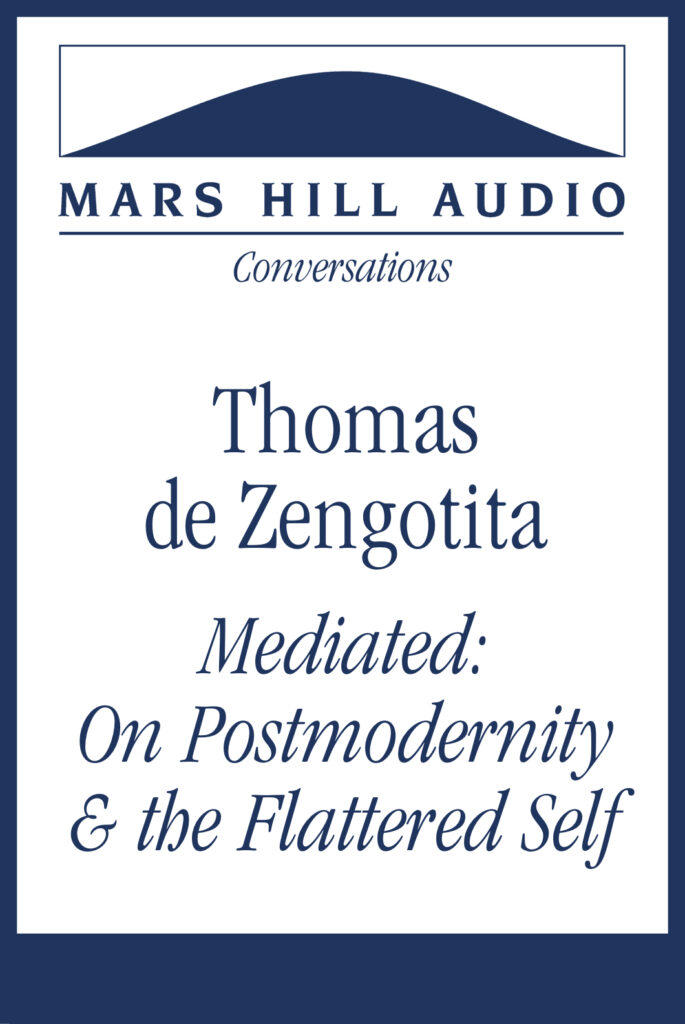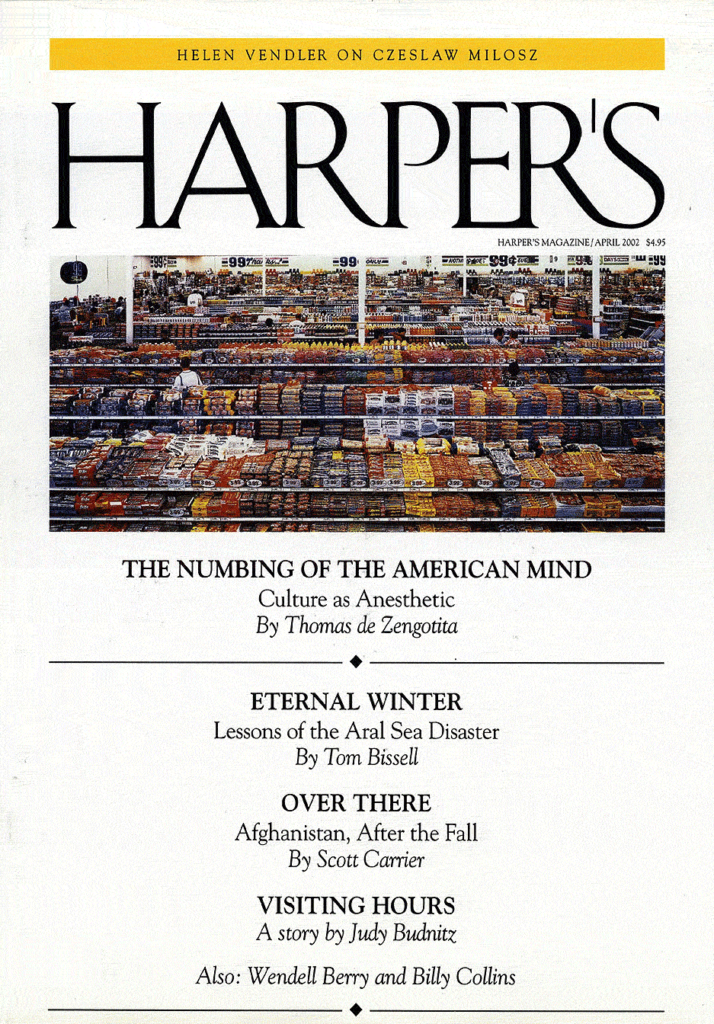released 9/19/2019
Thomas de Zengotita describes how the omnipresence of “representations” — forms of communication that have been deliberately manipulated and designed to address you—contributes to the widespread sense of entitlement and of identity as an autonomous chooser. The postmodern condition of being constantly addressed by advertising, emails, text messages, and television results in what de Zengotita calls “the flattered self,” a self, which if left unexamined, increasingly believes itself to be the center of the universe. In his book Mediated: How the Media Shapes Your World and the Way You Live in It, de Zengotita identifies how despite our unprecedented ability to “make ourselves,” the overwhelming flow of images, options, events, and stuff generates feelings of helplessness, apathy, ambiguity, and resignation, all of which are often evasively expressed in the multivalent utterance “Whatever.”
(59 minutes)
PREVIEW
The player for the full version of this Conversation is only available to current members or listeners with a legacy account. If you have an active membership, log in here. If you’d like to become a member — with access to all our audio programs — sign up here.
“Nietzsche was not thinking I.Q. or ignorance when he used the word ‘stupidity.’ He meant stupidity as in clogged, anesthetized. Numb. He thought people at the end of the nineteenth century were suffocating in a vast goo of meaningless stimulation. Ever notice how, when your hand is numb, everything feels thin? Even a solid block of wood lacks depth and texture. You can’t feel the wood; your limb just encounters the interrupting surface. Well, numb is to the soul as thin is to a mediated world. Our guiding metaphor. And it isn’t just youthful souls either.”
— Thomas de Zengotita, “The Numbing of the American Mind: Culture as Anesthetic” (Harper’s, April 2002)
Related reading and listening
- Self-transformation, American style — Jackson Lears on late-19th-century visions of rebirth
- Impact of “infotainment” on community — Neil Gabler and C. John Sommerville discuss how the mentalities conveyed by our experience with communications media work against the nurturing of community. (36 minutes)
- Defined by what we buy — FROM VOL. 48 Gary Cross argues that Americans are uniquely susceptible to the temptation to define ourselves by what we buy. (10 minutes)
- Sensory overload — FROM VOL. 59 Todd Gitlin discusses the effects of media saturation on our mental and emotional lives. (14 minutes)
- Self-knowledge versus “selfism” — FROM VOL.10 Psychologist Paul Vitz argues that the modern focus on self-actualization makes the self the highest good in the cosmos. (7 minutes)
- Infrastructures of addiction — Christopher Lasch on the subversive effects of the expectation of novelty
- Mars Hill Audio Journal, Volume 159 — FEATURED GUESTS:
Kirk Farney, Andrew Willard Jones, James L. Nolan, Jr., Andrew Kaethler, Peter Ramey, and Kathryn Wehr
- Philip Cushman on Constructing the Self — FROM VOL. 16Psychotherapist Philip Cushman explains how individual well-being becomes a goal, rather than a by-product of living in communities with a shared sense of purpose. (14 minutes)
- Mars Hill Audio Journal, Volume 154 — FEATURED GUESTS:
Felicia Wu Song, Michael Ward, Norman Wirzba, Carl Trueman, D. C. Schindler, and Kerry McCarthy
- Mars Hill Audio Journal, Volume 152 — FEATURED GUESTS:
Elisabeth Lasch-Quinn, Jeffrey Bilbro, Zena Hitz, James L. Nolan, Jr., Bishop Robert Barron, and Jason Blakely
- The restless vanity of the untrammeled self — Sociologist Daniel Bell on the rise of “the idea that experience in and of itself was the supreme value”
- “. . . improvising a raft after shipwreck . . . ” — Gil Bailie on symptoms and sources of the postmodern self adrift
- The existence of the “self” — Joseph E. Davis talks about the concept of identities and why some social theorists have questioned the very existence of selves. (14 minutes)
- Is there a transcendent order of which we are a part? — Sociologist Zygmunt Bauman argues that the spirit of the (hyper) modern world is one of relentless disposability and of denial of a transcendent order to the cosmos. (36 minutes)
- The nature of freedom reconsidered — In anticipation of this Fall’s Areopagus Lecture entitled “‘For Freedom Set Free’: Retrieving Genuine Religious Liberty,” we present selections from interviews with three MARS HILL AUDIO guests who have raised questions about the modern understanding of freedom. (27 minutes)
- Mars Hill Audio Journal, Volume 142 — FEATURED GUESTS:
Stanley Hauerwas, Perry L. Glanzer, Nathan F. Alleman, Jeffrey Bishop, Alan Jacobs, D. C. Schindler, and Marianne Wright
- Mars Hill Audio Journal, Volume 141 — FEATURED GUESTS:
Grant Wythoff, Susanna Lee, Gerald R. McDermott, Carlos Eire, Kelly Kapic, and James Matthew Wilson
- Martin Luther, Printing, and the Making of the Reformation — Historian Andrew Pettegree (Brand Luther: 1517, Printing, and the Making of the Reformation) describes how Luther’s facility for writing in German and his intuitive business sense spread ideas and transformed the distribution model of the printing industry. (55 minutes)
- Robert W. Jenson: “How the World Lost Its Story” — Theologian Robert W. Jenson describes how a postmodern world is characterized by the loss of a conviction that we inhabit a “narratable world” that exists coherently outside of ourselves. (40 minutes)
- Mars Hill Audio Journal, Volume 131 — FEATURED GUESTS:
John Durham Peters, Paul Heintzman, Richard Lints, Peter Harrison, Francis J. Beckwith, David L. Schindler, and Nicholas J. Healy, Jr.
- Mars Hill Audio Journal, Volume 118 — FEATURED GUESTS: Gilbert Meilaender, Ron Highfield, Mark Mitchell, Daniel M. Bell, Jr., Helen Rhee, and Peter Brown
- Immediately yours — Todd Gitlin on the effect of media on our sense of time
- Mars Hill Audio Journal, Volume 104 — FEATURED GUESTS: James Le Fanu, Garret Keizer, Daniel Ritchie, Monica Ganas, Jonathan Wilson-Hartgrove, and Peter J. Leithart
- Digital equality and the untuning of the world — Lee Siegel analyzes how web-based pursuits of unique identity is so unbounded that personal definition becomes impossible.
- Mars Hill Audio Journal, Volume 90 — FEATURED GUESTS: J. Mark Bertrand, Michael P. Schutt, Michael Ward, Dana Gioia, Makoto Fujimura, Gregory Edward Reynolds, Catherine Prescott, and Eugene Peterson
- Mars Hill Audio Journal, Volume 78 — FEATURED GUESTS: Mark Bauerlein, Elisabeth Lasch-Quinn, Sam Van Eman, Thomas de Zengotita, Eugene McCarraher, and John Witte, Jr.
- Mars Hill Audio Journal, Volume 68 — FEATURED GUESTS: Murray Milner, Jr., Steven C. Vryhof, Douglas J. Schuurman, Robert Gagnon, Richard Stivers, and Quentin Schultze
- Self, Society, and the Diagnosis of Addiction — Sociologist John Steadman Rice argues that the concept of codependency is rooted in the tenets of “liberation psychotherapy,” a way of thinking that can result in an asocial existence. (48 minutes)

